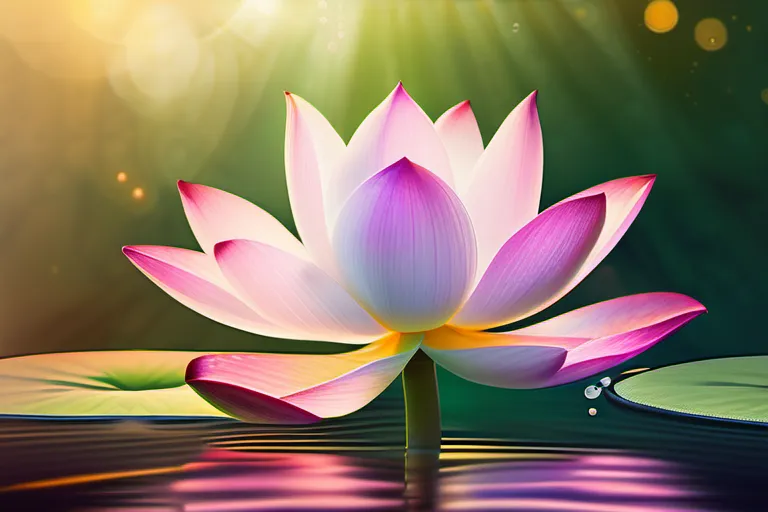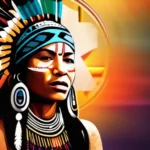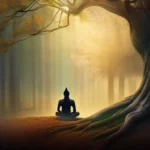Explore the beliefs, history, and science behind the concept of reincarnation.
Reincarnation is a fascinating belief that many cultures have embraced for thousands of years. In this article, we delve into the rich history, diverse interpretations, and scientific theories surrounding reincarnation. Join us as we uncover the mysteries behind this intriguing concept.
The origins of reincarnation
Imagine you’re sitting on a beach at sunset, watching the waves crash against the shore. Each wave is like a new life, crashing onto the sands only to recede back into the sea, leaving behind its essence in the form of sand and memories. This is a metaphor for reincarnation—a concept that has intrigued human minds for millennia.
Reincarnation is not just a simple idea; it’s a rich tapestry woven through the fabric of various cultures and belief systems across the globe. Let’s explore these ancient origins, starting with ancient India where the concept of samsara, or the cycle of rebirth, originated. Here, souls are believed to be immortal and subject to a continuous cycle of birth and death based on karma—a system of cause and effect.
Move westward, and we find Greek philosopher Pythagoras pondering similar concepts in his lifetime over 2500 years ago. According to legend, he claimed to remember past lives, questioning the nature of the soul’s existence beyond physical form. This belief spread through various Greek schools of thought, influencing thinkers like Plato who wrote about reincarnation in The Republic.
In Egypt, a pharaoh named Ramses IV inscribed his tomb with an acknowledgment that he had been a king before—reinforcing the idea that souls could be reborn into different forms. This belief was prevalent among many ancient Egyptians and contributed to their elaborate burial practices.
Turn northward to Tibet where the concept of reincarnation is central to Buddhist philosophy. Here, it’s not just a cycle but a process through which individuals are believed to be reborn as a means to achieve enlightenment. The Dalai Lama and other spiritual leaders are believed to reincarnate, carrying on their mission in new bodies until they reach the state of Buddhahood.
Even in more modern times, reincarnation has found its place in various belief systems, including some branches of Christianity, where concepts like Purgatory and the soul’s journey are reminiscent of reincarnation. These beliefs, while not mainstream, have been a part of human spiritual inquiry for centuries.
The origins of reincarnation span across continents and cultures, each adding its unique flavor to this ancient concept. From the mystical shores of India to the philosophical musings of Greece, from the spiritual practices of Tibet to the historical records of Egypt—reincarnation has been a constant thread in human exploration of life beyond death.
Key beliefs about reincarnation
What exactly do we mean when we talk about reincarnation? Is it just another way to imagine rebirth, or does it hold deeper truths about our existence and purpose? In many traditions, reincarnation is seen as a journey where souls return to physical life after death. But what exactly are the key beliefs that define this concept across various belief systems?
For Hindus, reincarnation is deeply intertwined with the idea of soul. The soul or Jiva Atma, according to Hindu philosophy, is eternal and unchanging. It migrates from one body to another based on its karma. This belief system suggests that our actions in this life determine where we go next—like planting seeds in a garden, each action has its own fruit.
Buddhism also explores reincarnation but with a twist. Here, the concept is about rebirth, rather than strict reincarnation. The soul doesn’t persist; instead, what changes is the consciousness that passes from one life to another. It’s like the wind blowing through the trees, each moment bringing new energy while the essence of the breeze remains constant.
In many African traditional religions, ancestors are highly revered and play a significant role in the lives of the living. Reincarnation is seen as a way for these spirits to continue their influence on the world. It’s as if the spirits transform into new forms, continuing their roles but with fresh perspectives. This belief emphasizes the cyclical nature of life and death, where each entity has its place in the cosmic dance.
The Aborigines of Australia also have a rich tradition that involves reincarnation. They believe that all living things are interconnected and that the spirit world is always present. In their view, reincarnation means that individuals can transform into animals or plants after death. This concept helps them understand the natural world as a seamless web of existence.
No matter the tradition, these beliefs about reincarnation share a common thread: the idea of continuity beyond physical life. It’s like writing a story where each chapter is a new chapter, yet the characters and themes remain constant, evolving with every turn of the page. This understanding helps people find meaning in their lives, offering hope for a better future based on the choices they make today.
The role of karma in reincarnation
The concept of karma plays a pivotal role in understanding reincarnation, much like how the threads in a tapestry intertwine to create its intricate design. How does good karma influence one’s journey back into life? Is it destiny or merely fate that guides us through this cycle?
In many traditions, karma is viewed as an unyielding force that shapes the next incarnation based on our actions in the current one. This belief suggests that every choice we make carries consequences, both positive and negative, which ultimately determine our future lives. It’s like planting a seed; depending on what you sow, so will your harvest be.
How can we reconcile the idea of bad karma? Do we simply suffer in subsequent lifetimes for past misdeeds? Or is there a chance to redeem ourselves and improve our next life through self-reflection and ethical behavior?
The cycle of reincarnation becomes almost like a complex narrative, where each episode is influenced by the outcomes of previous episodes. Just as a detective novel has clues leading to the final solution, the story of karma guides us towards understanding our current existence.
Moreover, the concept of karma raises questions about free will versus predestination in reincarnation. Can we truly make choices that change our path, or are we bound by past actions? Is it possible to break the cycle altogether through enlightenment and spiritual practices?
The interplay between karma and reincarnation is a fascinating exploration into the very fabric of existence. It challenges us to think deeply about our actions and their implications on future lives. As we navigate this intricate web, one thing remains clear: every moment counts in shaping not just our current life but also the ones yet to come.
Reincarnation in science: A closer look
Can science really delve into the realm where souls are thought to be reborn? Recent studies have started probing deeper into this enigmatic concept, seeking answers that might bridge the gap between belief and empirical evidence.
One of the most intriguing areas of research is in the field of near-death experiences (NDEs). Patients who experience cardiac arrest often report encountering vivid light, meeting deceased relatives, or even glimpsing their life review. While these experiences are not directly related to reincarnation, they do hint at a realm beyond our physical existence.
Scientists have also explored the phenomenon of “out-of-body experiences” (OBEs), where individuals seem to leave their bodies and observe events from an external perspective. Some argue that OBEs could provide evidence for consciousness existing independently of the body, suggesting pathways through which reincarnation might occur.
More recently, researchers have turned to studies involving memories or knowledge in newborns that seemingly cannot be explained by their direct life experiences. For instance, some infants are reported to show a preference for certain sounds or languages they had not been exposed to pre-birth. Could these instances be clues to past lives?
The field of parapsychology has also contributed to this discussion with experiments on reincarnation and past-life regression. While controversial, such studies offer fascinating insights into the possibility that our souls carry memories from previous incarnations.
However, it’s crucial to approach these findings with a critical eye. Just as in any scientific endeavor, the evidence for reincarnation remains anecdotal and subject to rigorous scrutiny. Yet, the ongoing exploration by scientists opens up new avenues of understanding about life beyond death, inviting us to reconsider our deepest beliefs.
As we continue to explore these questions, one thing is certain: The journey from birth to rebirth is as mysterious and complex as it is profound. Science may not have all the answers yet, but each study brings us closer to unraveling the mysteries of the soul’s eternal quest for understanding.
Modern interpretations and debates
Modern interpretations and debates about reincarnation are a fascinating tapestry woven from threads of spirituality, philosophy, and personal experience. In today’s world, where science seeks to demystify everything under the sun, how do we reconcile the concept of reincarnation? Is it just a quaint belief held by those who shy away from modern rationality, or does it hold deeper truths that challenge our understanding of existence?
Consider the metaphors we use in everyday language: ‘life is a journey,’ ‘we are all on different paths,’ and ‘every ending is a new beginning.’ These phrases resonate with the idea of reincarnation, suggesting that our current lives are but chapters in an ongoing narrative. How do these beliefs shape our worldview? Do they offer comfort or challenge us to embrace uncertainty?
In various spiritual contexts, reincarnation is seen as a way to address moral questions and injustices from past lives. Could the concept of karma, often tied to reincarnation, be a system for balancing good and bad deeds across lifetimes? Or is it simply a convenient narrative that absolves us of responsibility in this life?
Philosophers have grappled with reincarnation for centuries. René Descartes famously stated that the soul is immortal, but what does this mean in practice? If our souls live on after death, how do they connect to our present lives and identities? Are we truly responsible for actions taken by a past self we can barely recall?
The debate rages on. Some argue that reincarnation offers a sense of continuity and purpose, allowing us to correct our mistakes from previous lives. Others view it as a hindrance to living fully in the present, suggesting we are preoccupied with unfinished business or future selves. What do you believe? Is reincarnation a comforting notion, or does it strip away the preciousness of each moment?
The impact of reincarnation on personal growth
How does the belief in reincarnation shape your path to personal growth and spiritual development? Imagine life as a vast ocean, where each soul is like a diver exploring its depths. With every dive, you gain new insights, encounter different experiences, and perhaps even revisit places you’ve explored before—this can be seen metaphorically through the lens of reincarnation.
Reincarnation suggests that our soul travels through multiple lives, each offering unique lessons to learn and challenges to overcome. This idea can profoundly influence how we approach self-improvement. For instance, if you believe in reincarnation, you might look at your current life as a continuation of past experiences. You could ask yourself, “What did I miss out on last time? What am I doing differently this time around?”
This belief can also foster empathy and understanding towards others. If we believe that people we know have lived before in different forms, it might make us more patient and compassionate, knowing they are on a journey to learn and grow just like you.
Moreover, reincarnation opens up the realm of spiritual practice as a continuous endeavor. Instead of seeing spiritual growth as a linear path with a fixed endpoint, it becomes an ongoing exploration. Practices such as meditation, yoga, and self-reflection can be seen as tools for navigating this complex journey, helping us to remember our past lives and guide our current ones.
Consider the question: How do you reconcile your beliefs about reincarnation with actions that reflect personal growth? Does it change how you treat yourself or others? Do you find yourself making decisions differently because of this belief? The impact of reincarnation on personal development is profound and multifaceted, inviting us to explore the deeper meanings of our lives.
Conclusion
 After reading this article, you will gain a deeper understanding of reincarnation and its significance in various belief systems. You’ll also discover cutting-edge scientific research that sheds light on the possibility of life after death.
After reading this article, you will gain a deeper understanding of reincarnation and its significance in various belief systems. You’ll also discover cutting-edge scientific research that sheds light on the possibility of life after death.











